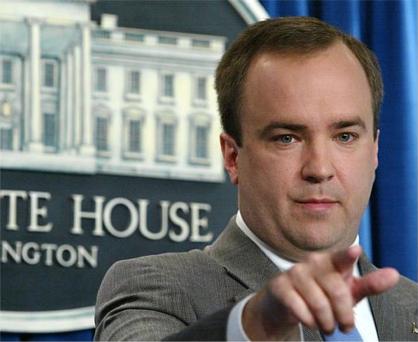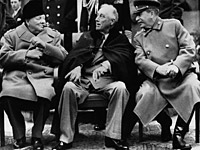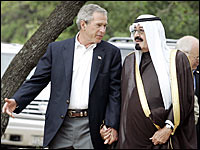The statement was typical Bush. In some ways it may have reflected a certain amount of truth. His victory was not a rousing mandate, but enough people decided to back him even though they questioned many of his policies including taking the nation to war in Iraq and were aware of the questionable use of intelligence in the selling of the war. A mandate it might not have been, but it certainly must have looked like a blank check to Bush and Rove.
A story in today's Washington Post raised the specter of the dreaded "Lame Duck" term. Bush may have squeaked through the election, but the people who once supported him are starting to have some buyers remorse. His polling numbers continue their downward slide and the President's number one policy initiative, Social Security privatization, has hit a brick wall, hard.
Even members of his own party are openly challenging the President's agenda. The recent move by Republican moderates (a relative term now) in the Senate nuclear option debate was a direct challenge to the Bill Frist/Tom DeLay-run Republican party. While they may have been raising their own status a bit, the move reflects a growing disgruntlement with a party leadership that seems more and more to be the political wing of the religious conservatives, to paraphrase the Republican former Senator, John Danforth.
That most of the recent slippage has occurred in the domestic arena is unsurprising. Since taking office, Bush's domestic agenda has taken a lot of heat from both the policy watchers and the public. The national security and foreign policy question, which many cite as pulling the President through the election, is a more vague area that many voters are unfamiliar with and are more willing to trust the administration due to their own lack of knowledge.
When it comes to the home-front, however, even the President's most popular ideas (e.g. No Child Left Behind) take a lot more scrutiny. People are comfortable dealing with their schools, retirement programs and grocery costs. They see the effects first-hand and are much more willing to take politicians to task when they start to tinker with them. A failing school and rising food costs are much more tangible than international diplomacy.
The more nuanced and concrete world of domestic policy is less affected by tough-guy rhetoric. The "compassionate conservativism" that Bush ran on in 2000 is resonates with more individuals, but its roots in liberal policies (medicare, social security, education funding) does not muster the rabid support among Bush's base, the base he is most able to motivate when challenging terrorists to "bring it on". He may, in fact, split his own support.
Republican congressmen seem to be picking up on this and as the President's focus turns inward to domestic issues, they are less willing to tow the administration's line and are demanding changes to the President's agenda. The social security privatization move has become such an albatross that some members of congress opt to stay in Washington when the President comes to their district, not the sign of healthy leadership.
The more moderate reality of the American people seems to deny the Republican leadership's cocksure assertion that they are the future of American politics and will never again return to the minority. While the Republican Party has made enormous gains in the past decade, they have done so by adopting liberal language that cloaks their true policy beliefs and the result of which has been a backlash against the party, mostly those in Congress. The Democrats faced a similar situation in the early nineties, a backlash that led to the Republican gains in Congress led by Newt Gingrich and his "Contract with America."
Bush has 3 1/2 years to go in his term and to discount the unquestioning support he inspires in people would be a bad move for the Democrats. They should focus on breaking the Republican control of Congress and highlight the Republican policies that are in fact out of step with the majority of Americans. The Social Security example is a perfect opportunity. Despite all the smoke, the people seem to realize that the President wanted to end a program that is arguably the most successful (certainly the most popular) government program in history. They should tie the Republicans to that lead balloon and proudly embrace their role as Social Security's protectors.
In the end, people support most of the domestic programs that have been enacted over the past century. The Bush wing of the Republican party (the Grover Norquist/"the business of government is business" wing) oppose the New Deal and Great Society programs that have been so successful and popular, and use deflective language to cover their actions to eliminate them.
The Bush administration would do well to mind the will of the people. A mistaken belief in one's own righteousness has hastened the fall of countless people and parties.
- Murphy





